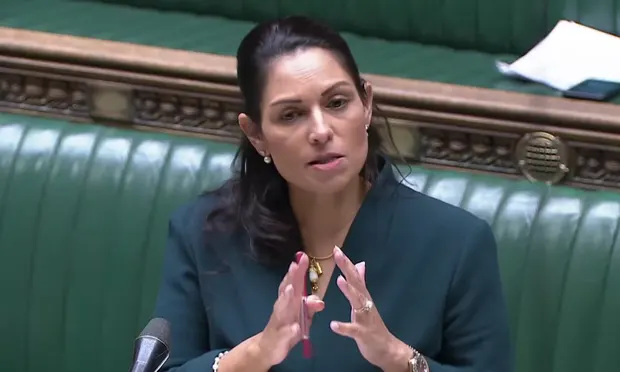Priti Patel has said key pillars of the government’s flagship illegal migration bill have been abandoned as a cabinet minister insisted the government could “make real and clear progress” on stopping small-boat crossings in the Channel.
The former home secretary tweeted on Tuesday: “We were told that the illegal migration bill would ‘stop the boats’. Key pillars of that bill have now been abandoned.”
She also used her Twitter account to highlight the fact that her former department was now spending £500,000 a day on 5,000 empty hotel beds as a buffer for higher than expected numbers of migrants crossing the Channel. Officials told the Commons public accounts committee the Home Office maintains the in an attempt to avoid a repeat of problems at the Manston processing centre in Kent.
Ministers have been forced to offer rebel Conservative MPs concessions on the bill amid growing concern that it would fail to pass through the Commons.
The government has dropped nearly all of the retrospective applications of the bill’s measures – a move that means Suella Braverman will no longer be obliged to deport thousands of asylum seekers who arrive in the UK this summer to a third country such as Rwanda.
Ministers will also limit plans to detain children and pregnant women who arrive in the UK on small boats. They have not offered any specific compromises to protect victims of modern slavery, as previously demanded by MPs, including Theresa May and Iain Duncan Smith.
Stride insisted the government was still on course to make “real and clear progress” on Rishi Sunak’s pledge to “stop the boats”, despite new figures showing that more than 1,300 migrants have crossed the Channel in three days, and Home Office data showing 686 people made the journey on Friday alone – the highest daily figure so far this year.
On the other central plank of the government’s plans, Stride predicted it would get the “right result” at the supreme court after a majority of appeal judges ruled this month that plans to deport asylum seekers to Rwanda to have their applications processed were unlawful.
Asked if there was a plan B, he told BBC Radio 4’s Today programme: “I don’t think that’s going to happen. At the court of appeal, the lead judge was in favour of the government’s decision. But we have had the opportunity now to address some of the issues that may have been of concern to other judges. It will now go to the supreme court and I suspect it will go through with the right result from the government’s point of view.”


